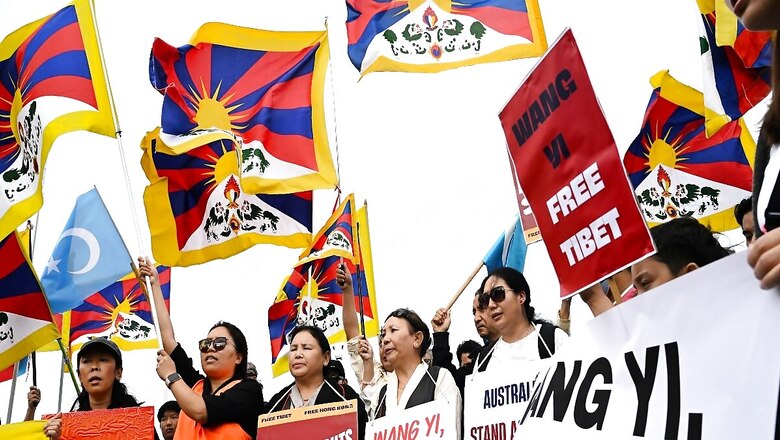
views
In a recent report by the Tibetan Centre for Human Rights and Democracy (TCHRD), based in India, a detailed analysis of Tibet’s current human rights scenario was unveiled. Contrasting sharply, China also submitted its own account to the UN’s Universal Periodic Review (UPR) session, asserting its commitment to the equality of all ethnic groups, honouring the religious beliefs and practices of its citizens, and safeguarding the rights and interests of every ethnic community.
Nevertheless, the findings of rights groups such as TCHRD, alongside corroborations from international human rights bodies, paint a grim reality for Tibetans under Chinese governance. They endure severe limitations and are often the targets of methodical suppressions affecting their freedom of speech, movement, and religious practices. These encroachments notably jeopardise academic liberties, exerting a disproportionate impact on China’s minority communities, notably the Tibetans, rendering them even more susceptible.
Under Xi Jinping’s leadership, China has experienced a resurgence of intense party indoctrination, manifesting in policies aimed at consolidating the Communist Party’s authority and ensuring its unchallenged legitimacy. This endeavour is part of a broader vision to mould China into a modern, potent socialist state, imbued with distinct “Chinese characteristics.”
Nonetheless, the plight of the Tibetan people predates these recent policy shifts, tracing back to the incorporation of Tibet into China in 1951. This annexation marked the beginning of a prolonged effort to dilute Tibetan identity through policies of sinicization. These strategies sought to cement Chinese dominance over Tibet by altering its demographic, cultural, and linguistic landscape, steering towards the eventual erasure of Tibetan cultural uniqueness.
The policy of sinicization, intensifying under Xi Jinping, has placed Tibetan Buddhism in jeopardy, especially after the 2016 directive advocating the sinicization of religions to align with China’s socialist ethos. This policy infringes upon the religious freedoms of Chinese citizens, particularly affecting minority faiths such as Tibetan Buddhism. The essence of Tibetan Buddhism is inextricably linked to the Tibetan language, underscoring the language’s crucial role in preserving Tibetan cultural identity and spiritual traditions.
Since 2010, China has enforced a so-called bilingual education policy across schools in minority regions, including Tibet, ostensibly to foster proficiency in both Mandarin and local languages. Yet, the primary language of instruction remains undefined. Over the last decade, this policy has subtly shifted towards prioritising Mandarin over Tibetan, mandating its use from the earliest levels of education. This shift wasn’t a choice but a mandate from Chinese authorities, pushing schools towards Mandarin instruction under the guise of cultural assimilation essential for ‘national unity’. This rationale posits cultural assimilation as a pathway to prosperity for Tibet, suggesting that without China’s ‘liberation’ (a euphemism for annexation), Tibet would have continued in poverty.
The Tibetan Action Institute (TAI) reports that around 80 per cent of Tibetan schoolchildren have been coerced into attending state-run boarding schools, where they are subjected to political indoctrination from a young age, designed to cultivate unwavering loyalty to the Chinese Communist Party and its government, thus quelling any potential dissent against Chinese sovereignty over Tibet. The United Nations Special Rapporteurs have raised concerns over the forced cultural assimilation of approximately one million Tibetan schoolchildren, who are mandatorily instructed in Chinese Mandarin, with a deliberate exclusion of Tibetan language, culture, and history from their curriculum. This government-endorsed strategy significantly threatens the cultural and linguistic heritage of Tibet.
According to the Tibetan Centre for Human Rights and Democracy (TCHRD), by 2023, it was observed that in numerous regions across Tibet, the teaching medium in primary and middle schools has been entirely switched to Mandarin. This shift has been facilitated through various policies and legal adjustments, purportedly to foster national unity and to equip Tibetan youths for future success, simultaneously eliminating Tibetan language education. This approach aligns with Xi Jinping’s vision for Chinese modernisation but relegates the preservation and promotion of the Tibetan language to a secondary, conditional status.
Concurrent with the promotion of Chinese Mandarin as the primary language of instruction, Tibet has seen the shutdown of local and private schools that previously served as sanctuaries for the learning of Tibetan language and religious practices. This is paralleled by the proliferation of state-operated boarding schools, which admit children as young as four, removing them from their families and communities. Such practices have been identified to inflict profound psychological trauma and foster a sense of detachment from their Tibetan heritage and familial bonds.
State-run boarding schools, mandating instruction exclusively in Chinese Mandarin and eradicating the Tibetan language serve as a deliberate strategy by Beijing for forced assimilation, designed to erode Tibet’s societal resilience. This approach facilitates an environment wherein Beijing can exert absolute dominion over the Tibetan plateau, exploiting its resources unopposed, as future generations of Tibetans, culturally merged with China’s predominant Han populace, are anticipated to offer no resistance.
The writer is an author and columnist and has written several books. His X handle is @ArunAnandLive. Views expressed in the above piece are personal and solely that of the author. They do not necessarily reflect News18’s views.


















Comments
0 comment